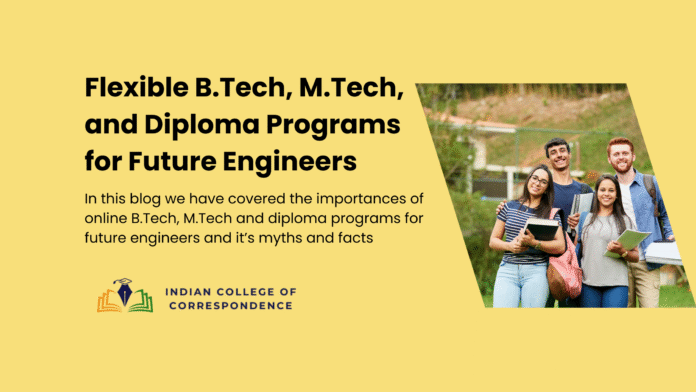In today’s fast-paced world, the engineering landscape is evolving rapidly. Engineers are no longer limited to traditional classroom learning. Flexible B.Tech, M.Tech, and Diploma programs have emerged as a game-changer, allowing students and working professionals to shape their education around their personal and professional lives. But why does flexibility matter so much, and how can it transform your career as an engineer? Let’s dive in.
Understanding B.Tech Programs
Overview of B.Tech Courses
A B.Tech (Bachelor of Technology) is a foundational program that equips students with technical knowledge in engineering and technology. Traditionally, B.Tech programs require full-time, on-campus attendance for four years.
Traditional vs. Flexible B.Tech Programs
Flexible B.Tech programs now offer modular courses, online lectures, and part-time options. These allow students to pursue education without disrupting personal commitments, making it easier for working individuals to enhance their skills.
Popular Specializations
Some of the trending B.Tech specializations include:
- Computer Science Engineering
- Mechanical Engineering
- Civil Engineering
- Electronics & Communication
- Information Technology
- Apply Now

The Rise of M.Tech Programs
Why M.Tech is Important for Engineers
An M.Tech (Master of Technology) builds on a B.Tech degree, offering advanced technical knowledge, research opportunities, and specialization in emerging fields. It’s ideal for engineers aiming for leadership roles, research, or academic careers.
Flexible Learning Options
Modern M.Tech programs often provide online, hybrid, and evening classes, enabling working engineers to upgrade their qualifications without leaving their jobs.
Specializations and Research Opportunities
Popular M.Tech specializations include:
- Data Science
- Artificial Intelligence
- Renewable Energy
- Robotics
- Structural Engineering
- Apply Now

Diploma Programs for Aspiring Engineers
What is a Diploma in Engineering?
A Diploma in Engineering is a shorter course, usually 2–3 years, that offers practical skills and foundational knowledge. It’s perfect for students who want to enter the engineering workforce quickly.
Advantages of Flexible Diploma Programs
Flexible diploma programs allow:
- Online classes or weekend sessions
- Hands-on workshops and virtual labs
- Integration with industry projects
Career Pathways with Diplomas
Graduates can work as technicians, junior engineers, or pursue further studies like lateral entry into B.Tech programs.
Benefits of Flexible Engineering Programs
Customizable Course Schedules
Students can select modules that fit their daily routine, ensuring balance between learning and personal life.
Online and Hybrid Learning Options
Flexible programs leverage online platforms, recorded lectures, and interactive sessions to provide learning anytime, anywhere.
Balancing Work and Study
Working professionals can pursue higher education without quitting their jobs, enhancing career growth and skill development.
Skill-Based Learning
Flexible programs focus on practical skills, industry projects, and problem-solving techniques that are highly valued by employers.
Who Can Benefit from Flexible Programs?
- Working Professionals: Upgrade qualifications or switch fields.
- Students with Commitments: Manage family or personal responsibilities while studying.
- Individuals Seeking Skill Enhancement: Learn new technologies or specializations quickly.
Key Features of Modern Flexible Programs
Modular Learning
Students can complete courses module by module, focusing on areas they need the most.
Industry-Aligned Curriculum
Programs are designed with inputs from top engineers and companies to meet real-world requirements.
Internship and Project Opportunities
Hands-on projects and internships help students gain practical exposure.
Recognition and Accreditation
Flexible programs from accredited institutes are recognized globally, ensuring credibility and career growth.
Technological Integration in Engineering Education
Online Lectures and Virtual Labs
Virtual labs simulate real-life experiments, making learning interactive and convenient.
AI and Simulations in Learning
Artificial Intelligence and simulation tools help students understand complex engineering concepts effectively.
Access to Global Resources
Students gain access to e-libraries, webinars, and international collaborations, broadening their knowledge horizons.
Choosing the Right Program
Comparing B.Tech, M.Tech, and Diploma Options
- B.Tech: Foundation and broad-based knowledge.
- M.Tech: Advanced specialization and research.
- Diploma: Shorter duration, practical skills, quick entry into workforce.
Factors to Consider
- Duration
- Flexibility
- Career goals
Future Trends in Engineering Education
Personalized Learning Paths
AI-driven platforms offer customized learning plans for individual students.
Lifelong Learning for Engineers
Continuous skill upgrades will be essential in the fast-changing engineering landscape.
Industry Collaboration and Mentorship
Partnerships with industries provide mentorship, internships, and exposure to emerging technologies.
Tips for Excelling in Flexible Programs
Time Management Strategies
Create schedules, prioritize tasks, and avoid procrastination.
Active Participation in Online Labs and Projects
Hands-on practice is key to understanding engineering concepts.
Networking and Professional Development
Join forums, webinars, and industry groups to build connections.
Conclusion
Flexible B.Tech, M.Tech, and Diploma programs are revolutionizing engineering education. They allow students and professionals to pursue their dreams, gain practical skills, and stay competitive in a rapidly evolving industry. Whether you’re starting your engineering journey or seeking to advance your career, embracing flexible programs can open doors to countless opportunities.
FAQs
- Can I switch from a diploma to a B.Tech later?
Yes, many institutions offer lateral entry programs allowing diploma holders to join B.Tech courses. - Are online B.Tech and M.Tech degrees recognized?
Accredited online degrees from recognized universities are globally accepted and valued by employers. - How long does a flexible diploma program take?
Typically, 2–3 years, but modular and part-time options can shorten or extend the duration. - Can working professionals manage flexible programs effectively?
Absolutely. Flexible schedules, online lectures, and project-based learning make it possible to balance work and study. - What career opportunities open up after M.Tech?
M.Tech graduates can pursue research, higher management roles, specialized engineering positions, or academic careers.
Do follow us on :



